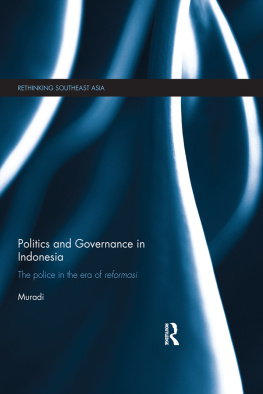The International Library of Sociology
DICTATORSHIP
AND
POLITICAL POLICE
Founded by KARL MANNHEIM
The International Library of Sociology
POLITICAL SOCIOLOGY
In 18 Volumes
I | The American Science of Politics | Crick |
II | The Analysis of Political Behaviour | Lasswell |
III | The Analysis of Political Systems | Verney |
IV | Central European Democracy and its Background | Schlesinger |
V | The Decline of Liberalism as an Ideology | Hallowell |
(The above title is not available through Routledge in North America) |
VI | Democracy and Dictatorship | Barbu |
VII | Dictatorship and Political Police | Bramstedt |
VIII | Federalism in Central and Eastern Europe | Schlesinger |
IX | History of Socialism | Laidler |
(The above title is not available through Routledge in North America) |
X | How People Vote | Benney et al |
XI | The Logic of Liberty | Polanyi |
(The above title is not available through Routledge in North America) |
XII | Pacifism | Martin |
XIII | Patterns of Peacemaking | Thomson et al |
XIV | Plan for Reconstruction | Hutt |
XV | Politics of Influence | Wootton |
XVI | Politics of Mass Society | Kornhauser |
(The above title is not available through Routledge in North America) |
XVII | Power and Society | Lasswell and Kaplan |
(The above title is not available through Routledge in North America) |
XVIII | Process of Independence | Mansur |
DICTATORSHIP
AND
POLITICAL POLICE
The Technique of Control by Fear
by
E.K. BRAMSTEDT
First published in 1945
by Routledge, Trench, Trubner and Co., Ltd
Reprinted in 1998, 1999, 2000, 2002
by Routledge
2 Park Square, Milton Park, Abingdon, Oxon, OX14 4RN
Transferred to Digital Printing 2007
Routledge is an imprint of the Taylor & Francis Group
1945 E. K. Bramstedt
All rights reserved. No part of this book may be reprinted or reproduced or utilized in any form or by any electronic, mechanical, or other means, now known or hereafter invented, including photocopying and recording, or in any information storage or retrieval system, without permission in writing from the publishers.
The publishers have made every effort to contact authors/copyright holders of the works reprinted in The International Library of Sociology. This has not been possible in every case, however, and we would welcome correspondence from those individuals/companies we have been unable to trace.
British Library Cataloguing in Publication Data
A CIP catalogue record, for this book
is available from the British Library
Dictatorship and Political Police
ISBN 0-415-17542-9
Political Sociology: 18 Volumes
ISBN 0-415-17820-7
The International Library of Sociology: 274 Volumes
ISBN 0-415-17838-X
Publisher's Note
The publisher has gone to great lengths to ensure the quality of this reprint but points out that some imperfections in the original may be apparent
FOREWORD
As its aims are set out in the Introduction, it is perhaps sufficient to mention here that this book was begun in the summer of 1942 and finished in August 1944. A few notes here and there in the text and the Appendices were added at the beginning of 1945 to bring the material up to date so far as it was possible under the difficult circumstances of war-time.
The chapter on the Italian Political Police was largely written on the basis of material compiled by Miss R. Loewenstein, who lived in Italy until 1939. Mrs. T. K. C. Cordes has revised the style of several chapters and Miss Joan Osborne has assisted in reading the proofs. Mr. Herbert Read was good enough to discuss problems of editing with me. To all these persons I wish to convey my sincere thanks. The responsibility for the views expressed in this book are, however, entirely mine. These pages could never have reached the press without the continued help given by my wife. My particular thanks are also due to her for the many hours spent in typing the draft.
I further acknowledge the courtesy of the Polish Ministry of the Interior in London for allowing me in 1942 to make use of one of its reports on the persecution of the Polish Jews by the Nazis. The full sources of material used will be found in the Notes at the back of the book, but I wish particularly to record here my debt to the works of F. A. Simpson ; J. Galtier-Boissire ; G. Salvemini ; H. Rauschning ; M. Dodd and P. Wallner.
E. K. B
LONDON,
February 1945.
CONTENTS
PART TWO : SECRET CONTROL IN OUR TIME
(AS DEVELOPED BT FASCISM AND NATIONAL SOCIALISM)
However much violence may be deplored, it is evident that, in order to make our ideals understood, we must beat refractory skulls with resounding blows... but this necessary violence must have a character and style of its own, definitely aristocratic.
Benito Mussolini (1921).
I declared then, before thousands of my fellow-countrymen, that every bullet fired from the barrel of a police pistol was my bullet. If one calls that murder, then I am a murderer.
Hermann Goring (1933).
INTRODUCTION : THREE PERTINENT QUESTIONS
Let us start by an imaginary flashback from some fifty or a hundred years ahead, to our own time. What will the historian writing in the next century probably regard as the main features of our age, marked as it is by two major wars ? I venture to predict that he will above all underline two decisive characteristics : one is the amazing pace of technical development, overcoming the barriers of space and time by means of the aeroplane, the radio, the amphibian vehiclethe other is the all-embracing attempt of comparatively small groups to terrorize large populations with the help of a well-calculated and organized control system. Both features are closely allied ; for only the modern scientific technical apparatus has enabled the Political Police to plan systematically and to strike swiftly. Undoubtedly, in its turn, the very existence of dictatorial groups in power, with an iron will to dominate and repress, has given strong incentive to further developments of new devices for control and destruction. From the domination of their own country, they marched forth to the conquest and subjugation of other lands, where an effort to withstand the enveloping tide could only be effective by exploiting to the full the potentialities of technical inventions and contrivances.












